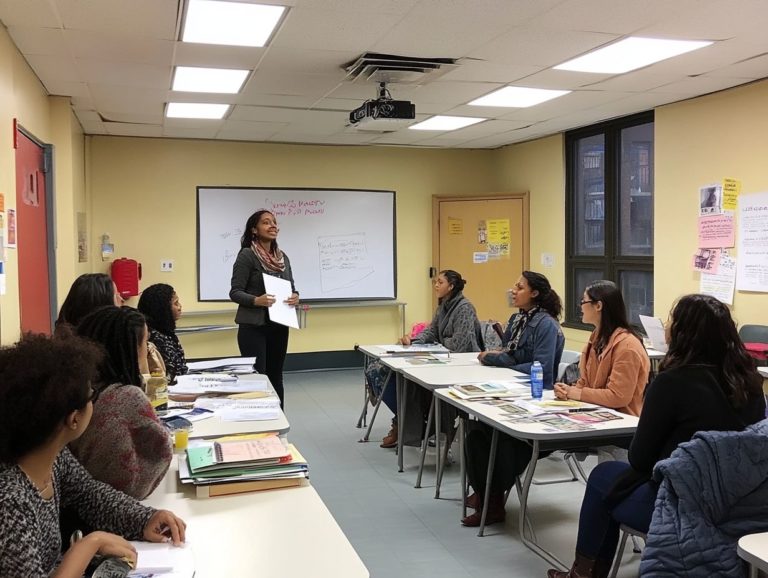Exploring Private Student Loans: Pros and Cons
Navigating the realm of student financing can feel daunting, especially with the myriad of options available.
Private student loans present distinct advantages that can effectively fill the gaps in funding your education. However, they also come with their own challenges.
This article will illuminate what private student loans entail, weigh their pros and cons, and explore alternatives such as scholarships and federal loans.
By the end, you ll have a clearer insight into whether private student loans align with your educational aspirations.
Contents
- Key Takeaways:
- Understanding Private Student Loans
- Pros of Private Student Loans
- Cons of Private Student Loans
- Alternatives to Private Student Loans
- How to Decide if Private Student Loans are Right for You
- Frequently Asked Questions
- What are private student loans?
- What are the pros of private student loans?
- What are the cons of private student loans?
- How do I apply for a private student loan?
- Can I use private student loans to cover any education-related expenses?
- What happens if I am unable to make payments on my private student loan?
Key Takeaways:

Private student loans offer flexibility and customization, allowing borrowers to choose their repayment terms and potentially lower interest rates. However, eligibility and co-signer requirements can be disadvantages, along with the potential for higher interest rates compared to federal loans. Exploring alternatives, such as scholarships, grants, or federal student loans, can help borrowers make informed decisions about whether private student loans are the right choice for them.
Understanding Private Student Loans
Understanding private student loans requires grasping their unique characteristics compared to federal loans, as well as their place within the wider landscape of educational financing.
With diverse interest rates, borrowing limits, and repayment options, private student loans can significantly influence your financial decisions. For many undergraduates and graduates, these loans provide vital funding to cover educational costs that federal loans may not fully meet.
However, it s crucial to navigate the application process and comprehend the loan requirements to make informed choices that align with your financial goals.
What Are Private Student Loans?
Private student loans are loans not provided by the government, offered by private lenders to assist you in financing your education.
These loans differ from federal student loans in several key aspects, including interest rates, borrowing limits, and repayment options.
While federal loans typically boast fixed interest rates and flexible repayment plans, private loans often come with variable rates that can fluctuate based on your credit score and financial history. This variability can lead to higher costs over time, making it essential for many applicants to secure a creditworthy cosigner a person who agrees to take responsibility for the loan if you can’t pay it back if they don t meet the criteria on their own.
Each private lender has its own set of eligibility requirements, which may include income verification and employment status. This can significantly affect how accessible these loans are for students like you who are looking to bridge the gap in educational expenses.
Pros of Private Student Loans
Private student loans offer remarkable flexibility and customization. This makes them appealing for students seeking financial aid tailored to their needs.
Flexibility and Customization
Flexibility and customization are the defining features of private student loans, allowing you to tailor your financial aid solutions to suit your unique educational journey.
These loans come with a variety of repayment plans that adapt to your financial situation. You can choose terms that align perfectly with your income and budget.
By allowing you to borrow only what you truly need, you can manage your education expenses without stretching your finances too thin. This level of flexibility can significantly ease the stress associated with potentially overwhelming student debt, as you can select repayment schedules that best fit your circumstances.
Some lenders even offer deferment options for times when financial hardship strikes, creating a robust safety net designed specifically for your needs.
Potential for Lower Interest Rates

One notable advantage of private student loans is the potential for lower interest rates. This is particularly true if you have a high credit score or a creditworthy cosigner.
This benefit can significantly alleviate the financial strain of educational expenses. Lower rates often lead to reduced monthly payments and overall loan costs.
As you evaluate different loan options, lenders typically look closely at your credit history and debt-to-income ratio. These factors play a crucial role in determining the interest rate you’ll receive.
Having a cosigner with strong credit can improve your chances of landing a favorable rate. This makes it easier to handle financial obligations after graduation.
By understanding these key factors, you can make well-informed choices that will influence your financial stability for years to come.
Cons of Private Student Loans
Private student loans can present advantages, but they also come with significant downsides.
You’ll encounter strict eligibility criteria and may need a cosigner to secure your loan. Be aware that these loans often carry higher interest rates, which can lead to financial challenges down the line.
Eligibility and Cosigner Requirements
Eligibility and cosigner requirements play a crucial role when contemplating private student loans. These often demand a solid credit history or a creditworthy cosigner.
These factors can greatly influence the borrowing process and the financial obligations you may encounter after graduation.
Many private lenders evaluate your creditworthiness to determine the interest rates and loan terms. Understanding how your credit history impacts these decisions is essential.
If you have limited or poor credit, securing a loan can feel overwhelming. This is where a cosigner, typically a parent or guardian, becomes invaluable.
This added layer of support simplifies the approval process and can result in more favorable terms. It highlights the significance of both personal and family financial stability in pursuing higher education.
Potential for Higher Interest Rates
The prospect of higher interest rates on private student loans can be a significant drawback, especially if your financial background or credit history isn’t strong.
These rates often surpass those of federal student loans, which typically come with more favorable terms and protections.
As a result, securing a private loan could lead to long-term challenges in managing student debt. It may quickly feel overwhelming.
With higher interest rates, staying ahead of accrued costs becomes daunting. This can lead to a mountain of debt that could take decades to pay off.
Unlike federal loans, private options usually lack essential repayment flexibility and forgiveness programs. This complicates your financial landscape even further.
Therefore, grasping the nuances of these loans is crucial for making informed decisions about financing your higher education.
Alternatives to Private Student Loans
Explore exciting alternatives to private student loans as you seek to finance your education without the weight of high-interest debt.
Options such as scholarships, grants, and federal student loans are available to alleviate financial stress. They provide a more manageable path to achieving your academic goals.
Scholarships and Grants

Scholarships and grants are invaluable forms of financial aid that you won t have to pay back. They are exceptional alternatives to student loans for covering educational expenses.
These resources take various forms, from merit-based awards celebrating academic excellence to need-based grants for those facing daunting tuition fees.
Unlike loans, which come with the burden of repayment and interest, scholarships and grants lighten the load of educational debt. This allows you to concentrate on your studies instead of fretting over finances.
The significance of these funds cannot be overstated. They substantially lower overall educational costs, making a college degree more attainable for a broader range of individuals.
By actively seeking out available opportunities, you can boost your financial health while chasing your academic aspirations.
Start your journey towards financial freedom today by exploring all your options!
Federal Student Loans
Federal student loans are a reliable choice that can ease your financial burden. With fixed interest rates and flexible repayment plans, they stand out as a smart option compared to private student loans.
These loans come packed with advantages, including lower interest rates than traditional financing. They offer various repayment plans designed to accommodate your unique financial situation.
One standout benefit is the availability of income-driven repayment plans. These plans adjust your payments based on how much you earn, making it easier to manage your loans during tough times.
The Free Application for Federal Student Aid (FAFSA) plays an important role in determining your eligibility. It unlocks access to crucial financial resources, grants, and other forms of aid that can significantly lighten the load of higher education costs.
How to Decide if Private Student Loans are Right for You
Determining whether private student loans are the optimal choice for your educational financing requires a thoughtful assessment of various factors. Consider your financial situation, loan eligibility, and the potential for financial challenges both during and after your academic journey.
Considerations and Steps for Decision Making
When you’re contemplating private student loans, several important steps and financial choices are necessary to ensure you make a decision that aligns seamlessly with your educational and financial aspirations.
Evaluate your current financial situation first. Look closely at your income, expenses, and any existing debts. Understanding your financial standing will enable you to determine how much you can comfortably borrow without stretching yourself too thin.
Next, grasp the nuances of various loan options, like fixed versus variable interest rates. Understanding these can significantly impact your overall cost. It’s equally important to compare different lenders, not only regarding interest rates but also their terms, repayment plans, and reputations for customer service.
Each of these considerations is vital in crafting a well-informed decision that aligns with your long-term objectives.
Frequently Asked Questions
What are private student loans?

Private student loans are loans offered by banks, credit unions, and other private lending institutions to help students pay for their education. These loans are not funded by the government and have different terms and conditions compared to federal student loans.
What are the pros of private student loans?
The main advantage of private student loans is that they can cover the full cost of education, including tuition, housing, and other expenses. They also have more flexible borrowing limits and repayment options, often with lower interest rates for students with a strong credit score.
What are the cons of private student loans?
One of the biggest drawbacks of private student loans is that they do not offer the same protections as federal student loans, such as income-driven repayment plans and loan forgiveness options. They often require a cosigner and may have higher interest rates for students with a weaker credit score.
How do I apply for a private student loan?
Applying for a private student loan is straightforward! Just reach out to your chosen lender and follow their application process, which may involve submitting financial documents and providing information about your intended school and program of study.
Yes, private student loans can be used to cover various education-related expenses, including tuition, textbooks, housing, meal plans, and other fees. However, it is important to carefully consider the amount you borrow and only use the loan for necessary expenses to avoid accruing unnecessary debt.
What happens if I am unable to make payments on my private student loan?
If you are unable to make payments on your private student loan, you should contact the lender immediately to discuss your options. Depending on the lender, you may be able to defer payments, enter into a forbearance period, or explore other repayment options. However, it is crucial to keep in mind that missing payments can negatively impact your credit score and may lead to legal action from the lender.






